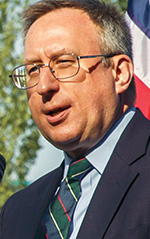The Foreign Service at 100: It’s Time for Renewal
Speaking Out
BY GEORGE KROL
Since retiring from the State Department at the end of 2018, I have read with great interest the numerous reports and articles regarding reform and the future of the U.S. Foreign Service, including those featured in the pages of the FSJ during this year’s centennial. I served in the Foreign Service for 36 of its 100 years; those long years have given me some ideas about how to improve the Service.
Speaking Out is the Journal’s opinion forum, a place for lively discussion of issues affecting the U.S. Foreign Service and American diplomacy. The views expressed are those of the author; their publication here does not imply endorsement by the American Foreign Service Association. Responses are welcome; send them to journal@afsa.org.
Getting Back to Basics
First, we need to define the essential work and value of the Foreign Service. Aside from the important and necessary administrative and legal (i.e., consular) duties members of the Foreign Service perform, the professional diplomat has four major functions: (1) to facilitate communication with the host government; (2) to understand in depth the host government and society; (3) to persuade the host government to take stances in support of U.S. policies and interests; and (4) to represent the United States and its policies publicly to broader audiences in host countries.
The State Department should prioritize training Foreign Service officers in these core missions from day one. As many before me have noted, the department does not do enough to equip officers with the basic skills needed to perform these duties at the start and throughout the course of their careers.
Too often, officers are thrown into sometimes-murky pools of diplomacy abroad, where they can struggle to keep afloat. Yes, embassies can and should train officers in the field; but our embassies are often too busy and understaffed to make this training a priority. Moreover, most FSOs have no training in how to train other officers.
As a section head, deputy chief of mission (DCM) and even ambassador, I often asked myself why I was spending so much time being a copy editor for officers who seemed unfamiliar with basic principles of grammar, or why some officers seemed to have no idea how to negotiate and work in another culture outside the embassy’s perimeter.
A six-week orientation class (that we knew as A-100 when I joined) does not produce competent diplomats ready to hit the ground running when they arrive at a U.S. mission abroad. Other agencies of the U.S. government require their entry-level officers to undertake many months or even years of basic tradecraft training before deployment, as do many other foreign diplomatic services.
Officers need instruction in the basics of diplomacy, ideally using relevant case studies to prepare them before they go abroad. I know I could have used such training before my first assignment to our embassy in Warsaw in 1982 under conditions of martial law. Before arriving at post, I got six months of Polish language training, a couple of sessions of area studies, a week of consular training, and a stern lecture from Diplomatic Security. Economic reporting and cable writing did not figure in the mix.
What is needed is stricter enforcement of existing rules regarding Foreign Service recruitment, training, and service.
I agree with the reports that call for officers, especially those who aspire to enter the Senior Service, to hone their basic skills and add new ones like management and leadership throughout their careers. Unfortunately, the department does not make most such training mandatory. For those who do participate, a two-week course in leadership training does not a leader make.
Such training, along with courses focused on diversity and ethics, seems to have become mainly a box-checking exercise. The short courses for DCMs and ambassadors are simply not enough to develop seasoned leaders, not to mention the absence of required management training for all first-time section chiefs.
Too often in embassies the blind are leading the blind. Why? Well, now we get to the nub of the problem: Foreign Service culture.
Changing the Culture
Many reports point to Foreign Service culture as a problem, but I’ve seen none that suggest what should be done about it. Too many officers, anxious to rise rapidly up the ladder, skip “tedious” intermediary home and foreign assignments. They focus on Washington networking over acquiring deep foreign area and management experience that take years in the field to develop. For the ambitious officer, training and overseas assignments can be seen as obstacles rather than skill-building requirements for promotions.
In my own career, I purposefully sought a progression of increasingly senior desk and embassy jobs in a conscious effort to learn all aspects of the Foreign Service, from desk officer to office director to deputy assistant secretary in Washington, D.C., and from consulate reporting officer to embassy section chief, DCM, and ambassador at various posts overseas. The department did not require this progression, but it certainly made me a better, more effective officer and enriched my career.
Unfortunately, it seems the Foreign Service is largely dominated at the highest ranks by those who, having spent a tour or two at embassies early on in their careers, got on the Washington fast track that catapulted them from executive assistant to senior positions, including rewards of ambassadorships, without having acquired intermediary hands-on experiences at embassies or desks.
While some of these officers made the leap because of extraordinary abilities, others appear to have benefited from their network of relationships within the political levels of the department and the executive branch, setting unfortunate examples that many ambitious officers seek to follow in pursuit of what they consider career success.
Too often, it seems to me, the department makes exceptions to the rules governing the Foreign Service, enabling and even encouraging this counterproductive culture. And, perhaps most discouragingly, those who benefited from this culture often become Foreign Service mandarins, exerting tremendous influence from their perches on the seventh floor. I do not see the culture of the Foreign Service changing if these officers continue to dominate.
Looking back, I see in my own career the great value of service in Washington, D.C., as a necessity for understanding and working with and within the Washington policymaking and political world, but that experience served to complement rather than substitute for an extensive range of overseas assignments.
To build a truly effective Foreign Service, emphasis should be placed on ensuring officers spend the bulk of their careers abroad, learning and practicing the diplomatic trade, rather than in domestic assignments where they can lose—or never effectively attain—that unique perspective FSOs can and should provide policymakers.
Restoring Discipline
The rules and regulations governing our Service, as established by the Rogers Act and subsequent reforms, do not need much change. The traditional “eight-year rule”—which states that an officer cannot be domestically assigned for more than eight consecutive years—provides a framework for a balanced career encompassing both overseas and D.C.-based assignments, while established performance standards set requirements for acceptable work.
What is needed is stricter enforcement of existing rules regarding Foreign Service recruitment, training, and service. I used to think the Director General would have the ultimate authority to enforce the rules, but it appears that this authority, if it ever existed, has eroded, leaving an office that first and foremost takes its orders from the seventh floor rather than defending and maintaining the integrity of the Service as a professional, nonpolitical institution.
I do not fault the courageous people who have held that unenviable position, but they need clear, independent authority to govern the Service without political influence or the influence of senior FSOs holding seventh-floor positions.
The breakup of [the USSR] ushered in a period of American diplomatic exuberance that went overboard in treating the world as ours to mold.
I find it rather ironic that some senior seventh-floor FSOs have called for reforms after leaving office but were apparently unable to implement reforms while they occupied positions of authority and influence in the department. Of course, to be fair, reform is always easier said than done, especially when reform itself is not among the highest priorities of the department’s senior political leadership.
Frankly, I do not believe the Foreign Service bureaucracy can reform itself on its own. By their very nature, bureaucracies are averse to change; they are the institutional keepers of the prevailing culture. Change usually must come from the outside, in this case from Congress, as was the case in the Rogers Act, or from the executive branch political leadership, if that leadership is committed to real change and has the political will and congressional support to make it happen.
Unfortunately, I do not see the political stars aligning for that scenario anytime soon.
Diplomacy in a Changed World
Finally, I think it is evident that U.S. diplomats have not adjusted to the reality of a world that has so profoundly changed. Fundamentally, the United States is no longer, if it ever was, the omnipotent and all-knowing power that many U.S. diplomats seem to think it is. The age of America asserting that it can solve all the world’s problems is over.
The Cold War, during which I entered the Service, imposed certain restrictions on U.S. diplomacy and diplomats, and we had a canny and powerful state to contend with in the USSR. The breakup of that entity ushered in a period of American diplomatic exuberance that went overboard in treating the world as ours to mold.
The traditional skills of effective negotiation and diplomatic engagement were left to atrophy as our policymakers turned more and more to military force and righteous demands, relegating diplomacy to the back burner in dealing with the world’s knotty problems. We lost our sharpness, our desire to listen and to learn.
The Service turned to proselytizing and striving to be “agents of change and transformation” in other countries, with predictably negative results. Diplomacy should uphold values in its application but not force other countries and societies to accept our worldview.
Many officers, particularly those with a Peace Corps or missionary background, told me they joined the Service to change the world, to make it a better place, and I saw how disappointed they became when the world did not change as they wished. I, too, shared that feeling when I first joined the Service, but over time I saw that successful diplomacy requires a clear eye, abundant patience, understanding of the human psyche, and a willingness to seek compromise to advance, even incrementally, clear realistic national interests. Otherwise, we are truly sent abroad on a fool’s errand.
In a world of competing interests, dangers, and violence, where the U.S. is not omnipotent, we need professional diplomats now more than ever—to understand the messy world we live in, to communicate effectively with governments whether we like their policies or not, and to provide sound policy advice grounded in experience and understanding of the real world beyond our borders.
The Rogers Act addressed this need in the aftermath of World War I. Now, heading into 2025, with the world in turmoil around us, it is time to renew, reinforce, and reinvigorate the fundamental and historic mission, purpose, and discipline of the Foreign Service as the Rogers Act itself envisaged.
When sharing or linking to FSJ articles online, which we welcome and encourage, please be sure to cite the magazine (The Foreign Service Journal) and the month and year of publication. Please check the permissions page for further details.
Read More...
- “Train, Reward More FSOs As Multilateral Negotiators” by Stephanie Smith Kinney, The Foreign Service Journal, February 1997
- “History of a Handshake: Ground Level Public Diplomacy in Belarus” by George Krol, The Foreign Service Journal, September 2020
- “Practical Lessons for Today’s Foreign Service” by George Krol, The Foreign Service Journal, December 2021





